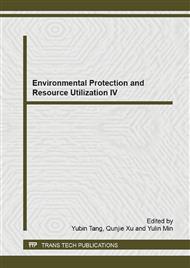p.889
p.894
p.898
p.905
p.911
p.915
p.920
p.924
p.929
Information Technology Based Municipal Solid Waste Management in Shanghai, China
Abstract:
The amounts of municipal solid waste (MSW) are increasing dramatically in metropolis, such as Shanghai in China, due to rapid economic development and urbanization, and it has brought a significant challenge to ecological situation of the city. It is concerned to establish an innovated management system for MSW reducing, recycling, and reusing (3Rs). Thus, information technologies are introduced with the objectives to establish an integrated, and cost-effective solid waste management system. In this system, Radio Frequency Identification (RFID) technology is applied to collection, transportation, and disposal of MSW. Meanwhile, source separation is also combined as a best practice for management of trash and recyclable materials. The paper infers that the establishment of information management system of MSW will offer opportunities to MSW management by reducing secondary pollution and improving efficiency of collection and transportation.
Info:
Periodical:
Pages:
911-914
Citation:
Online since:
December 2014
Authors:
Price:
Сopyright:
© 2015 Trans Tech Publications Ltd. All Rights Reserved
Share:
Citation:


